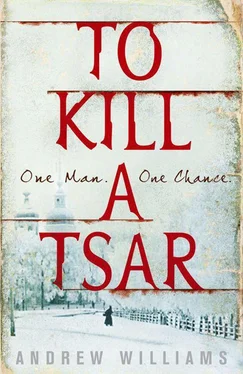‘You’re safe and you’re here.’ Mikhailov lifted his glass in salute. ‘Comrade Councillor — this is my friend, the Director.’
‘It’s almost nine o’clock!’ said Tarakanov. ‘We were expecting you sooner.’
‘I’m sure our comrade would enjoy a glass of your excellent wine,’ said Mikhailov with an easy smile. ‘Then you must excuse us. We have urgent business.’
Tarakanov bit his lip and looked on the point of voicing resentment at being eased out of his drawing room. With the confidence of a man who is used to being obeyed, Mikhailov lifted his chin.
‘Is there something wrong, Ivan Fedorovich?’
‘You don’t understand the risks I’m taking,’ said Tarakanov sullenly.
Mikhailov smiled. ‘And I’m grateful for your efforts on behalf of the party. So — just a few minutes, if you please?’
They waited until the door closed behind him and they could hear the squeak of his shoes on the polished parquet in the hall. Mikhailov slid impatiently to the edge of the divan. ‘Well, do they know?’
‘Not yet. They have some papers,’ said the Director, pulling at his beard.
‘What papers?’
‘A rough plan of the palace, with markings.’
‘They don’t suspect?’
‘I don’t think so. The special investigator spends most of his time at the “Preliminary” with the prisoners.’
‘Has anyone given anything away?’
‘No. No.’ Rising to his feet, the Director began to shuffle restlessly about the room with his wine glass, picking up small objects, peering at the councillor’s pictures. He looked tired and distracted, Mikhailov thought, the loneliness, the strain of living with the enemy, the constant fear of discovery, was obviously taking its toll.
‘How did the police find Kviatkovsky’s flat?’
‘Evgenia Figner,’ replied the Director, bending to look at a small silver icon that was hanging beside the mantelpiece. ‘The city police arrested a student with copies of the party’s manifesto and she told them she had been given them by Evgenia.’ Evgenia had given her real name, he explained. A foolish mistake. All the police needed to do was check it against their register of addresses.
‘That was careless,’ said Mikhailov. ‘It almost led to the arrest of Olga and Anna too.’
‘Yes. Anna.’
‘Is there something wrong?’
The Director settled on the divan beside him, his knee bouncing nervously, turning the empty wine glass in his hand. ‘Do you know of an Englishman called Hadfield?’
‘Yes.’
‘Is he a member of the party?’
‘No.’
‘The special investigator thinks he may be. I’ve just written his name on a new file. He made the mistake of visiting Anna’s house. Major Barclay questioned him but let him go.’
‘Oh?’
‘And he may know the Volkonsky woman too.’
Mikhailov reached over to the wine bottle and poured the Director a little more. ‘Are they going to question him again?’
‘I don’t know. Perhaps. Do you trust him?’
‘No.’
‘Do you trust her?’
‘Anna? Of course. But there is madness in love.’
‘Love?’
‘Nothing. A foolish thought,’ said Mikhailov irritably.
‘I must go,’ said the Director, and throwing his head back he gulped down the claret. ‘What a waste.’
‘Post a note at the flat in Troitsky Lane when you have more.’
The Director nodded, pushing his spectacles up his nose. At the door he turned to Mikhailov again. ‘How long now, Alexander?’ There was an unmistakable weariness in his voice.
‘Five weeks, my friend. Have courage. We’ll be ready in five weeks.’
For all its dangers, Anna’s new life in the city as an illegal was more fulfilled than the one she had known in the village. To her neighbours at 11 Podolskaya Street, she was the house maid Elizaveta Terenteva, who had moved from Kiev to live and work for her cousin and her lodgers. Under this guise she helped her comrades with a printing press they had brought piece by piece to the apartment. They could only use it when they were sure no one could hear its thump and squeak. More often than not they were obliged to ink the type and print by hand, pressing the paper down with a brush. The work was tedious and slow but Anna took pleasure in the lively companionship of the other women, the sharp humour of Olga Liubatovich and the warmth and sensitivity of a new comrade — Praskovia Ivanovskaia. Nikolai Morozov lived in the apartment as a ‘lodger’ too but he was too grand for inky fingers and spent most of the day shaping and reshaping the party’s programme for power. ‘So this is your new society is it?’ Olga teased. ‘Where the women still do all the work?’
At three o’clock each day, they would sit together for soup and a meat course and talk of small things. If the conversation turned to policy, Anna would listen but play no part. Her comrades did not ask her about the night she had spent away from the apartment and she did not speak of Hadfield. But Olga had drawn her aside to remind her pointedly they were ‘illegals’ and if the police caught one they would probably catch all. It was a heated exchange, Anna demanding to know what she was being accused of, her friend refusing to say. The atmosphere in the apartment was poisonous, until Praskovia lost patience with both of them and insisted on reconciliation ‘for the sake of the revolution’.
Two days later, Alexander Mikhailov came to see her and it was apparent as soon as he stepped across the threshold that he was out of sorts. She noticed the same chilliness in his manner she had met on the night she rejected his advances. After examining the first copies of the new leaflet without enthusiasm, he turned to her.
‘I have a job for you.’ He corrected himself: ‘The executive committee has a job for you.’
‘Of course. I’m an agent of the executive committee.’
Olga looked uncomfortable. ‘I’ll make some tea,’ she said, a note of forced bonhomie in her voice.
‘It’s a pick-up from Nikolaevsky Station. You’ll need to take two men from the new workers’ section. Their details are here.’ Mikhailov handed Anna a piece of paper. ‘Meet the 7.30 from Moscow in two days time. 18 December.’
‘What am I picking up?’
‘You don’t need to know that,’ he replied sharply. ‘The delivery address is on the paper — Vasilievsky Island — the 11th Line. I’m sure you won’t have any difficulty finding it.’
Anna frowned, the colour rising in her face. ‘Is there something you want to say to me?’
‘If you mean the doctor, that is a matter for the executive committee, not me.’
‘It isn’t anyone’s concern.’
Mikhailov stared at her for a moment and she returned his gaze without flinching.
‘Do you deny you’ve seen him?’
‘No. Why should I? We agreed he would be useful.’
Mikhailov laughed unpleasantly: ‘I see.’
‘This is none of your business,’ she said.
‘But it is a matter for the executive committee. When you’ve delivered the cases come to my apartment.’
‘Why?’
‘To answer to the committee.’
A torn yellow copy of The People’s Will’s programme lay in the middle of the iron table between them like sacred text. Collegiate Councillor Dobrshinsky was as familiar with its words as the prisoner with the tousled red hair and intense gaze opposite him. He had studied it carefully and spent many hours listening to Goldenberg speak of the ‘new order’ it would help to shape, of freedom, democracy, an end to the old autocracy. He was speaking of it now, almost gabbling, leaning across the table with his hands together.
‘…if the government — the tsar — decides to yield to the people then I know the party will give up its violence…’
Читать дальше












